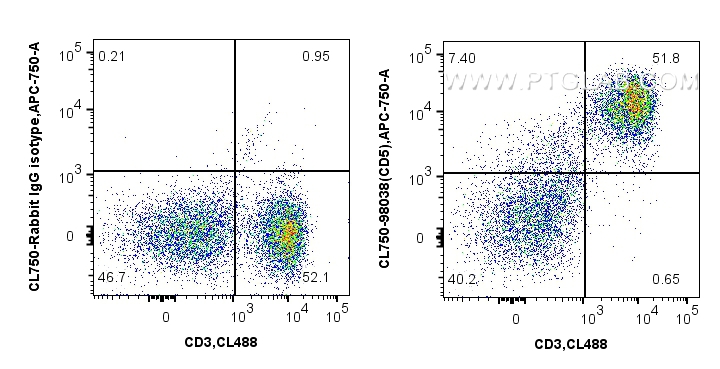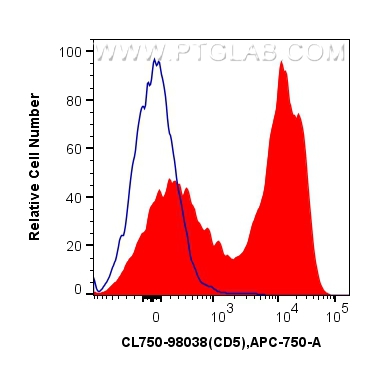CoraLite® Plus 750 Anti-Mouse CD5 Rabbit Recombinant Antibody
CD5 Uni-rAbTM Recombinant Antibody for FC
Host / Isotype
Rabbit / IgG
Reactivity
mouse
Applications
FC
Conjugate
CoraLite® Plus 750 Fluorescent Dye
CloneNo.
240244A7
验证数据展示
经过测试的应用
| Positive FC detected in | mouse splenocytes |
For other applications, we recommend the unconjugated version of this antibody, 98038-2-PBS
推荐稀释比
| Application | Dilution |
|---|---|
| This reagent has been tested for flow cytometric analysis. It is recommended that this reagent should be titrated in each testing system to obtain optimal results. | |
| Sample-dependent, Check data in validation data gallery. | |
产品信息
CL750-98038-2 targets CD5 in FC applications and shows reactivity with mouse samples.
| Tested Applications | FC Application Description |
| Tested Reactivity | mouse |
| Immunogen | Fusion Protein 种属同源性预测 |
| Host / Isotype | Rabbit / IgG |
| Class | Recombinant |
| Type | Antibody |
| Full Name | CD5 antigen |
| Synonyms | Lyt 1, Ly A, Ly 12, Ly 1, CD5 antigen |
| Calculated Molecular Weight | 54 kDa |
| GenBank Accession Number | NM_007650.3 |
| Gene Symbol | Cd5 |
| Gene ID (NCBI) | 12507 |
| Conjugate | CoraLite® Plus 750 Fluorescent Dye |
| Excitation/Emission Maxima Wavelengths | 755 nm / 780 nm |
| Form | Liquid |
| Purification Method | Protein A purification |
| UNIPROT ID | P13379 |
| Storage Buffer | PBS with 0.09% sodium azide. |
| Storage Conditions | Store at 2-8°C. Avoid exposure to light. Stable for one year after shipment. |
背景介绍
CD5 is a type I transmembrane glycoprotein of the scavenger receptor cysteine-rich family (PMID: 12403363). CD5 is expressed on a majority of thymocytes, mature T cells, B cell subsets, and peripheral blood dendritic cells (PMID: 9858516; 6156984; 10379049; 1384337). CD5 may act as a receptor in regulating T-cell proliferation. It functions as a negative regulator of TCR signaling during thymocyte development (PMID: 7542801).
实验方案
| Product Specific Protocols | |
|---|---|
| FC protocol for CL Plus 750 CD5 antibody CL750-98038-2 | Download protocol |
| Standard Protocols | |
|---|---|
| Click here to view our Standard Protocols |


